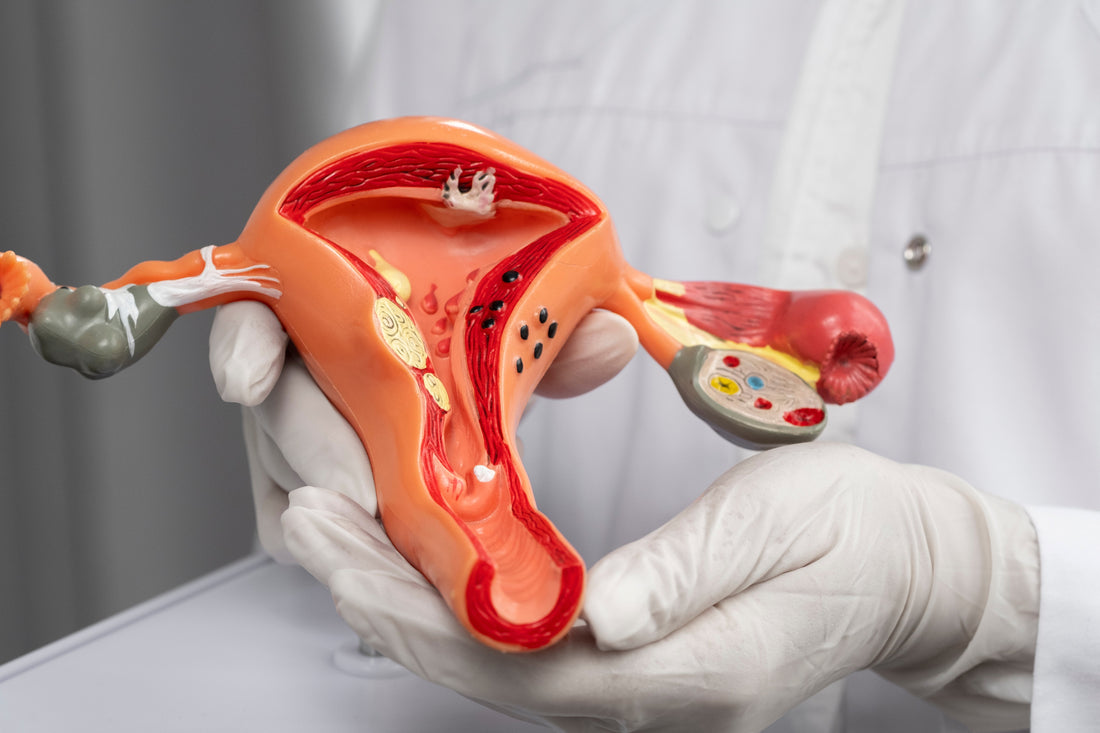
Understanding Ovarian Cysts: A Guide for Young Women
Share
Ever thought about those weird ovarian cysts loads of young women get? Hearing the word "cyst" might freak you out, but chill out! , these cysts are just part of what happens every month in your body, and they go away on their own. Though, if you've got cysts that keep coming back or hurt a lot, it's pretty important to get what's going on with your insides.
Let’s break down what ovarian cysts are, why they affect so many young women, and how taking care of your hormone health—including using women’s health supplements—can make a big difference.
Understanding Ovarian Cysts
Picture ovarian cysts as small, fluid-packed bubbles hanging out on or within your ovaries. Sizes can vary—some are as small as a pea, some as big as an orange. Here's the upbeat part: They're not a big deal! Chances are most women will get at least one cyst in their lives, and might not even notice.
Here's the lowdown on different cysts you gotta know:
- Functional cysts: normal and pop up during your menstrual cycle. Chill out — they often vanish without any fuss.
- Dermoid cysts: These may contain hair, skin, or other tissue (yes, really).
- Cystadenomas: These bad boys take root on the surface of your ovaries and are packed with either a water-like or goop-like liquid.
- Endometriomas: These guys show up when stuff that should line your uterus decides to grow elsewhere.
- Polycystic ovaries (PCOS): If your hormones are outta whack, this can cause a bunch of tiny cysts to huddle together.
Why Are Young Females Affected?
Women going through puberty to menopause, chances are higher for you to get ovarian cysts. It's because during these years, your hormones are super busy and your body's in the middle of its regular menstrual thing.
Common Symptoms of Ovarian Cysts
So, about these cysts, not all give you issues to notice, but keep an eye on stuff like:
- Pelvic pain (especially one-sided)
- Bloating or abdominal discomfort
- Pain during periods or sex
- Irregular cycles
- Frequent urge to urinate
- Back or leg pain
- Trouble emptying the bladder
Note: If you ever feel a sharp, sudden pain or experience nausea and fever, see a doctor immediately. This could indicate a ruptured or twisted cyst.
What Triggers Ovarian Cysts in Young Females?
It's good to know the reasons behind ovarian cysts to dodge them and snag treatment . Peep these regular factors that might play a role:
1. Hormonal Imbalances
Cysts popping up? Might be 'cause your hormone vibe is off. If your body pumps out heaps of estrogen or slacks on the progesterone, it could jumble up your ovulation game and drop cysts on you.
Young gals often hit hormone wobbles thanks to:
- The rollercoaster of puberty
- Everyday stress overload
- Flipping your eating script
- Skimping on z's
- Kicking off or ditching birth control
Adding natural hormone-balancing supplements to your routine can support a more stable cycle and reduce PMS symptoms.
2. Polycystic Ovary Syndrome (PCOS)
PCOS is a familiar issue impacting a bunch of young ladies. Your ovaries go a bit overboard with the male hormone production causing your period to get wonky, skin breakouts, putting on extra pounds, and a collection of tiny cysts forming.
Even though these cysts are teeny, they're stubborn and can mess with your chances of getting pregnant unless you deal with them.
Things that might cause PCOS cysts:
- Genetics
- Insulin problems
- Excess weight
- Inflammation in the body
Opting for a healthy diet and physical activity might boost your fight against PCOS symptoms.
3. High Levels of Stress
Stress doesn't create cysts, but it sure throws a wrench in your hormone levels. When you're feeling the pressure, your body cranks up the cortisol. This shake-up in your normal hormone levels can cause you to miss periods and even lead to the formation of cysts. To keep your hormones in a good mood, take a shot at chillaxin' with yoga, mindfulness activities, or herbal goodies.
4. Unhealthy Diet and Lifestyle
Chowing down on a lot of junk food and sweets can mess with your insulin sparking hormone imbalances and leading to PCOS. Slacking on exercise and skimping on shut-eye can also throw your body's hormones out of whack.
To cut down your cyst risk, give these a go:
- Munch on whole foods like veggies, fruit, and grains.
- Pick proteins and fats that are good for you.
- Sip on herbal teas, take spearmint for example.
- Keep up your water intake.
Choosing natural boosters with hormone-friendly herbs can be a smart step toward better health.
5. Choosing Fertility Medications or Birth Control
Certain meds to aid fertility, Clomid for one, could push your ovaries into overdrive. This might up the chance of cysts forming. Birth control pills can mess with your hormone levels more so when you quit them out of the blue, which may result in cysts popping up for a short time.
Be sure to talk to your doc before you switch up your meds, the ones messing with your hormones .
How Are Ovarian Cysts Diagnosed?
Got some weird symptoms? Your medical person might throw out these suggestions to test for 'em:
- Do a pelvic exam
- Recommend an ultrasound
- Run blood tests to check hormone levels
- Perform a laparoscopy in more complex cases
Your doc will put these tests to use to get the 411 on your cyst situation: the type size, if it's a chill lurker or a troublemaker that needs the boot, and to see if you're also dealing with stuff like PCOS or endometriosis.
Do Ovarian Cysts Affect Fertility?
Usual cysts that show up and disappear with your menstrual cycle don't mess with your chances to have kids. But if you're dealing with PCOS or endometriomas (also called chocolate cysts), getting pregnant might be tougher because they might mess with when you ovulate.
Look on the bright side though: lots of young women with ovarian cysts still manage to have babies on their own or might need a little nudge from fertility treatments. Spotting and handling any issues fast is crucial.
How to Support Your Hormones
Keeping your hormones in check is wicked important to avoid and control ovarian cysts. You gotta listen to your doc, but adding in some nature-friendly supplements and tweaking how you live can help.
Why Try MS. Perfect – Women Wellness?
MS. Perfect – Women Wellness got whipped up for gals wrestling with period woes, unpredictable skin flares, puffiness, and the monthly hustle.
This herbal concoction serves to:
- Level out your lady hormones
- Smooth out your cycle
- Ease the sting of PMS
- Lift your spirits and zip
- Cut down your risk of hormone-related cysts
For keeping those minor hormonal hiccups in check , it's the bomb.
When to See a Doctor
Sure, not every cyst is a problem, but you gotta hit up a doctor if you're dealing with:
- Intense quick pain in the lower abdomen
- Constant feeling of being bloated or stuffed
- Pain paired with fever or nausea
- Menstrual cycles that aren't consistent after three months
- Struggles with conceiving
These symptoms can signal more severe conditions like ovarian torsion, endometriosis, or persistent PCOS, which all require medical attention.
Equipping Young Women with Knowledge and Support
To improve your health, start by knowing your own body. Yes ovarian cysts are pretty normal but don’t shrug off red flags—those that cause discomfort or return often.
Navigating teenage or young adulthood brings a ton of changes, and understanding your menstrual health is crucial. You can take charge by:
- Track your cycle with a calendar or app
- Prioritize sleep, movement, and stress management
- Eat hormone-friendly foods
- Consider women’s wellness supplements like MS. Perfect for ongoing support
- Stay informed and proactive about reproductive health
Conclusion
Ovarian cysts might freak you out, but they're just your system's way of telling you to take better care. They can pop up from hormone shifts, too much pressure, or your daily routine, but these little fluid bags are just a shout-out that your reproductive system is looking for more stability.
With the right education, a balanced lifestyle, and support from natural women's health supplements, you can effectively manage—and even prevent—issues related to ovarian cysts. So, don’t ignore what your body is trying to tell you. Learn, listen, and take control of your hormonal health today.

